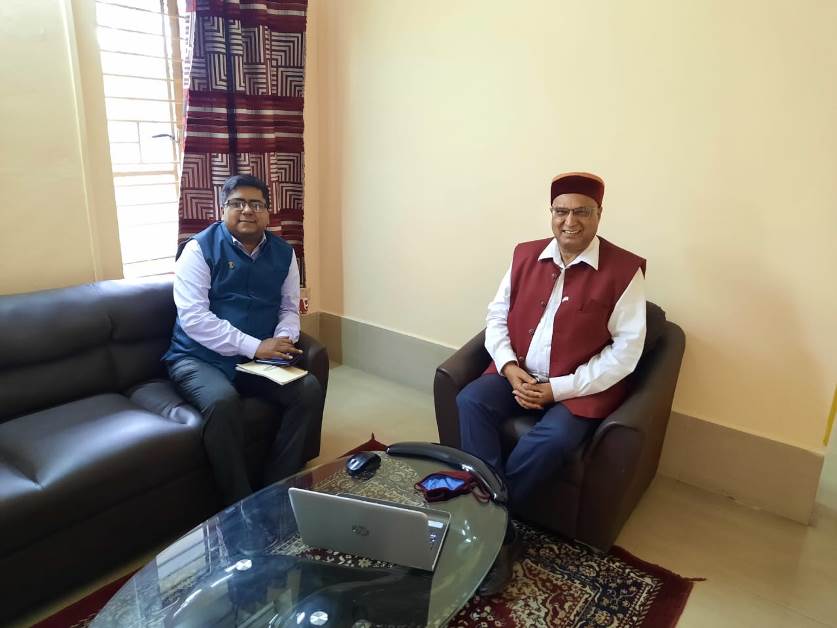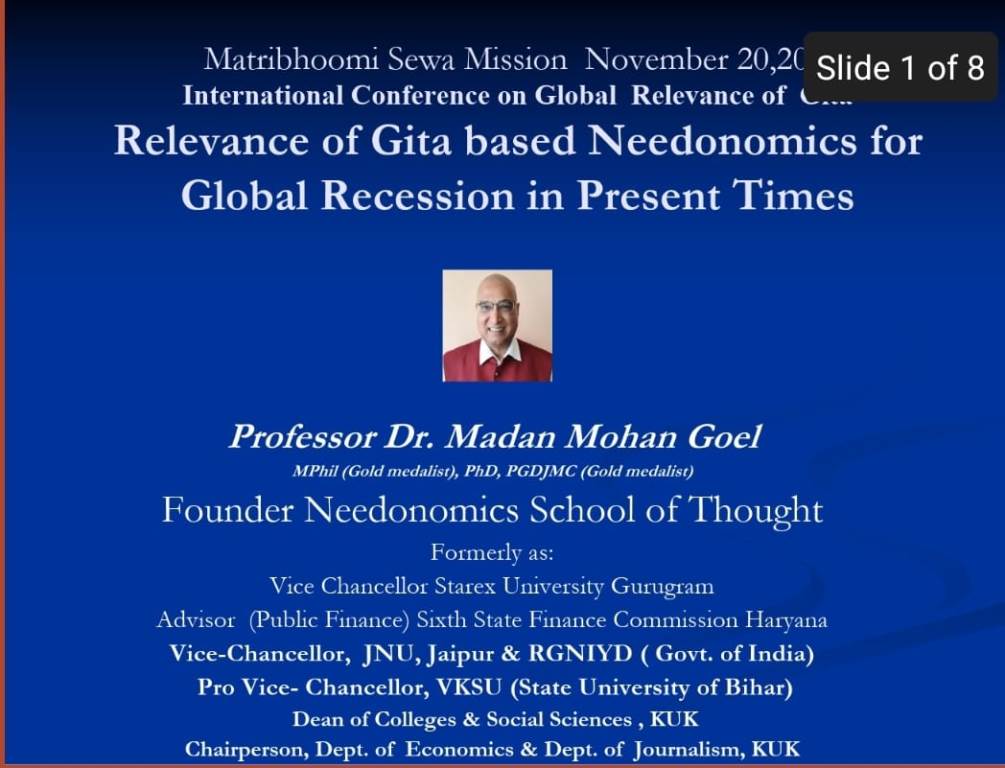Revival of global economy calls for the Principle of Needonomics: Professor Goel
 Biswadeep Gupta
Biswadeep Gupta

Former Vice Chancellor Dr. M.M. Goel, known as ‘Needonomist’ Professor retired from Kurukshetra University, Kurukshetra who talks of ‘Needonomics’ for the revival of post-pandemic global economy with Biswadeep Gupta at Assam University, Silchar. At present, he is the Advisor of Public Finance, 6th State Finance Commission, Haryana
Biswadeep Gupta (BG): Can you please brief us on the concept of Needonomics?
Prof: MM Goel: Needonomics (economics of needs) is based on Bhagavad Gita as an ‘Idea of India’ which is nonviolent, ethical and spiritual in nature confining to needs. It says no to greed which falls in the domain of greedonomics (economics of greed ). It authenticates the economic thoughts of Mahatma Gandhi to a considerable extent.
I believe that ‘needonomics’ is necessary and sufficient for solving the economic and non-economic problems anywhere in the world including India.
Needonomics is required for saying no to most of the problems caused by Greedonomics (economics of greed) including violence, terrorism, exploitation, deprivation, discrimination, discontent and corruption of all kinds prevailing in the society. Endless greed is the real menace facing the world today.
To my mind, an economist who speaks and argues needonomics is known as Needonomist.
BG: Which should be done to practice the principle of ‘Needonomics?’
Prof: MM Goel: To implement the principle of ‘Needonomics’, I believe that strategy of spiritually guided materialism (SGM) flowing from Life Insurance Corporation (LIC) of India’s slogan seen in the logo ‘yogakshemam vahamyaham’ is in Sanskrit which loosely translates into English as “Your welfare is our responsibility” derived from sloka no 22 of chapter 9 of Bhagvad Gita “ananyāśh chintayanto māṁ ye janāḥ paryupāsate teṣhāṁ nityābhiyuktānāṁ yoga-kṣhemaṁ vahāmyaham”. Meaning thereby “There are those who always think of Me and engage in exclusive devotion to Me. To them, whose minds are always absorbed in Me, I provide what they need and preserve what they already possess”
Revival of the global economy calls for the Principle of Needonomics
Professor Madan Mohan Goel
Recession in the global economy including India is a reality to be accepted by all the stakeholders in an economy. It needs proper diagnosis by the economists of all shades and creed with Gita based wise words of wisdom (www) to create a conducive climate and work culture with the honesty of purpose. It needs to be understood, analysed and interpreted that spiritualism and materialism are complementary to each other and not substitutes. To mitigate the miseries of materialism, modern economics must consist of spiritualism which is necessary and sufficient for the ethical behaviour of economic actors including consumers, producers, distributors, traders and above all policymakers and facilitators. Economists have a unique responsibility towards the moral empowerment of all the actors in the economy.
BG: Who does a consumer adopt Needonomics?
A consumer as a hero of economics is always interested in heroin (goods and services) and all those who pollute the relationship are called villains in the real drama in the market. Everyone is a consumer and is expected to behave in the market with rational behaviour which falls in the domain of consumer psychology.
Consumer psychology is the study of why and how people buy things in the market (online and offline). Every consumer should consume goods and services as per their needs. It is unfortunate that leading economists of the world promote greed as the basis of economic growth, turning it into a “Greedonomics”. Economics should be based on need, not on greed. It should be a “Needonomics”, and not a “Greedonomics”.
BG: You advocate Street Smart person in present global dynamics. Can you elaborate?
Prof: MM Goel: A person is street smart with attributes including simple, moral, action-oriented, responsive and transparent (SMART) along with needonomics in the present economic scenario of materialism and consumerism. We have to adopt SIMPLE model of empowerment consisting of six human development activities such as spiritual quotient (SQ) development, intuition development, mental level development, love oneself attitude development and emotional quotient (EQ) development. The synergy of these six aspects is an essential requirement for us to emerge and realize our full potential.
To ensure public participation in Atamnirbhar Bharat Abhiyan, we need to become street smart in using smartphones under digital India for most of the activities online.
BG: What is your thought process about globalization in present times of Covid created economic crisis?
Prof: MM Goel: To my mind, globalization is internationalization of Indianization which I have been promoting since 1991.

The global leadership and their think-tank have to accept the realities of economic crisis in terms of slow growth rate, recession if not depression. Is there any mantra to fix the problems in the Indian economy? Should we think of Atamnirbhar Bharat Abhiyan as panacea for reviving the economy?
To implement the vision of ‘Atamnirbhar Bharat Abhiyan announced by the Indian prime minister, we should avoid over emphasizing ‘vocal for local’ and be little diplomatic and use the wisdom for ‘Glocalization’ meaning thereby think globally and act locally for promoting Vasudhiava Kutumbakam (the world is one family) as the Indian ethos.




